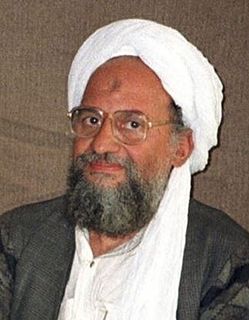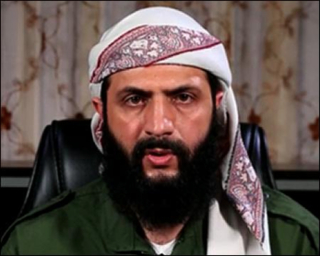Related Research Articles

Al-Qaeda, officially known as Qaedat al-Jihad, is a multinational militant Sunni Islamic extremist network composed of Salafist jihadists. It was founded in 1988 by Osama bin Laden, Abdullah Azzam, and several other Arab volunteers during the Soviet–Afghan War.

Ayman Mohammed Rabie al-Zawahiri is an Egyptian terrorist known for being the leader of terrorist group al-Qaeda since June 2011, succeeding Osama bin Laden following his death, and is a current or former member and senior official of Islamist organizations which have orchestrated attacks in Asia, Africa, and also some in North America and Europe. In 2012, he called on Muslims to kidnap Western tourists in Muslim countries.
Muhajir or Mohajir is an Arabic word meaning migrant which is also used in other languages spoken by Muslims, including English. In English, this term and its derivatives may refer in a general sense to individuals or groups, including the following incomplete list:
Jihadism is a neologism which is used in reference to "militant Islamic movements that are perceived as existentially threatening to the West" and "rooted in political Islam." Appearing earlier in the Pakistani and Indian media, Western journalists adopted the term in the aftermath of the September 11 attacks of 2001. Since then, it has been applied to various insurgent Islamic extremist, militant Islamist, and terrorist individuals and organizations whose ideologies are based on the Islamic notion of jihad.

The Islamic State, at times known as the Islamic State of Iraq and the Levant or the Islamic State of Iraq and Syria and also referred to by its Arabic-language acronym Daesh, is an Islamist militant jihadist group and former unrecognized quasi-state that follows a Salafi jihadist doctrine based on the Sunni branch of Islam. It was founded by Abu Musab al-Zarqawi in 1999 and gained global prominence in 2014, when it drove Iraqi security forces out of key cities during the Anbar campaign, which was followed by its capture of Mosul and the Sinjar massacre.

Al-Nusra Front or Jabhat al-Nusra, known as Jabhat Fatah al-Sham after July 2016, and also described as al-Qaeda in Syria or al-Qaeda in the Levant, was a Salafist jihadist terrorist organization fighting against Syrian government forces in the Syrian Civil War. Its aim was to establish an Islamic state in the country. The group has changed its name several times and merged with and separated from other groups.

Foreign fighters have fought on all four sides of the Syrian Civil War, as well both sides of the War in Iraq. In addition to Sunni foreign fighters, Shia fighters from several countries have joined pro-government militias in Syria, leftist militants have joined Kurdish fighting forces, and other foreign fighters have joined jihadist organizations and private military contractors recruit globally. Estimates of the total number of foreign Sunnis who have fought for the Syrian rebels over the course of the conflict range from 5,000 to over 10,000, while foreign Shia fighters numbered around 10,000 or less in 2013 rising to between 15,000 and 25,000 in 2017.

Ahmad Abousamra, known also as Abu Sulayman ash-Shami and Abu Maysarah ash-Shami, was a Syrian-American Islamic militant and ideologue who served as the chief editor of the Islamic State of Iraq and the Levant's Dabiq magazine. In 2013, he was placed on the US Federal Bureau of Investigation's 'most wanted list' and made the subject of a $50,000 reward because of his connections to a Massachusetts terrorism investigation centering on his alleged close associate Tarek Mehanna, who was arrested in 2009 and convicted of terrorism-related charges in a Boston court in late 2011. He was featured on the FBI's Most Wanted Terrorists list for allegedly attempting to obtain military training in his trips to Yemen and Pakistan for the purpose of killing American soldiers overseas.

Jund al-Aqsa, later known as Liwa al-Aqsa after 7 February 2017, was a Salafist jihadist organization that was active during the Syrian Civil War. Formerly known as Sarayat al-Quds, the group was founded by Abu Abdul 'Aziz al-Qatari as a subunit within the al-Nusra Front. The group later became independent, because al-Nusra was growing too rapidly for its resources and had suffered from fighting the Islamic State of Iraq and the Levant. On 20 September 2016 the U.S. Department of State designated Jund al-Aqsa as a terrorist organization. The group rejoined al-Nusra Front, by then renamed Jabhat Fateh al-Sham (JFS), in October 2016. However, on 23 January 2017, JFS declared that Jund Al-Aqsa was no longer part of Jabhat Fateh Al-Sham. In early February 2017, some of Jund al-Aqsa's units joined the newly formed Tahrir al-Sham, while the others refused and formed a new splinter group called Liwa al-Aqsa, and captured many towns in northern Hama and southern Idlib from other rebel groups. Following these attacks, Tahrir al-Sham launched a military operation against Liwa al-Aqsa, accusing them of being an ISIL affiliate. Following intense clashes with Tahrir al-Sham, up to 2,100 Liwa al-Aqsa militants left Idlib Province to join ISIL in Raqqa Province, by 22 February 2017.

The Khorasan group, sometimes known simply as Khorasan, is an alleged group of senior al-Qaeda members operating in Syria. The group is reported to consist of a small number of fighters who are all on terrorist watchlists, and coordinates with al-Nusra Front, al-Qaeda's official affiliate in Syria. At an intelligence gathering in Washington, D.C. on 18 September 2014, Director of National Intelligence James Clapper stated that "in terms of threat to the homeland, Khorasan may pose as much of a danger as ISIS."

Ahmed Hussein al-Shar’a, known by the nom de guerreAbu Mohammad al-Julani, is the commander-in-chief of the Syrian militant group Tahrir al-Sham; he was also the emir of its predecessor organisation al-Nusra Front, the Syrian branch of al-Qaeda. The US State Department listed Al-Julani as a "Specially Designated Global Terrorist" in May 2013, and four years later announced a $10 million reward for information leading to his capture. As of February 2021, the bounty remains in force.

The Ahlus Sunnah Wal Jamaah Association of Australia (ASWJA) was founded by Melbourne sheikh Mohammed Omran. Ahlus Sunnah Wal Jamaah is a generic term referring to Sunni Islam. Those who adopt it as organisational name do so as adherents of the Salafi movement in Australia, US, UK, and Canada.
Sami al-Oraydi is a senior sharia official for the Guardians of Religion Organization, who was the chief religious authority for al-Nusra Front and the group's former second-in-command.

Radwan Nammous, also known by his nom de guerre Abu Firas al-Suri, was a senior official in the al-Qaeda affiliated al-Nusra Front, serving as the group's spokesman.

Samir Hijazi, known as Abu Humam al-Shami or Faruq al-Suri, was the military chief of al-Qaeda's Syrian affiliate al-Nusra Front. He became the head of the Guardians of Religion Organization in February 2018, though he was replaced by Khalid al-Aruri.
Qatar has been accused of allowing terror financiers to operate within its borders, which has been one of the justifications for the Qatar diplomatic crisis that started in 2017 and ended in 2021. In 2014, David S. Cohen, then United States Under Secretary of the Treasury for Terrorism and Financial Intelligence, accused Qatari authorities of allowing financiers who were on international blacklists to live freely in the country: "There are U.S.- and UN-designated terrorist financiers in Qatar that have not been acted against under Qatari law." Accusations come from a wide variety of sources including intelligence reports, government officials, and journalists.
Abdullah Abd al-Rahman Muhammad Rajab Abd al-Rahman, known as Ahmad Hasan Abu al-Khayr al-Masri, was an Egyptian al-Qaeda leader who has been described as the general deputy to al-Qaeda leader Ayman al-Zawahiri.
Abu Khalid al-Suri, or Mohamed al-Bahaiya or Abu Umayr al-Shami, was a Syrian jihadist militant often affiliated with Osama Bin Laden’s al-Qaeda and the Syrian Islamist group Ahrar al-Sham. Al-Suri was believed to be assassinated by an ISIL suicide attack in 2014, however ISIL denied involvement in the attack.
The history of the Islamic State of Iraq and the Levant (ISIL) began with the group's foundation in 1999 by Jordanian Salafi jihadist Abu Musab al-Zarqawi under the name Jamāʻat al-Tawḥīd wa-al-Jihād. In a letter published by the US State Department in February 2004, Zarqawi wrote that jihadists should use bombings to start an open sectarian war in Iraq so that Sunnis from other countries would mobilize against the assassinations carried out by Shias, specifically the Badr Organisation, against Ba'athists and Sunnis. The Islamic State would eventually grow to control territory with a population of millions.
References
- ↑ "Counter Terrorism Designations and Removals (Office of Foreign Assets Control, Specially Designated Nationals List Update)". US Department of the Treasury. 19 May 2016. Retrieved 5 October 2016.
- 1 2 "Counter-terrorism related sanctions listing" (Press release). Minister for Foreign Affairs (Australia) (foreignminister.gov.au). 20 August 2015. Retrieved 5 October 2016.
- 1 2 3 4 5 6 7 Welch, Dylan (25 July 2016). "Abu Sulayman Australia's most senior al Qaeda operative". ABC News (Australia) . Retrieved 25 July 2016.
- ↑ Toohey, Paul (News Corp Australia Network) (23 May 2015). "Australian extremist preacher a likely target for elimination by drone strike". news.com.au. News Limited . Retrieved 5 October 2016.
- 1 2 "Former Sydney hate preacher Abu Sulayman al-Muhajir appears in pro-jihad film aligned with bin Laden". Dailytelegraph.com.au. Retrieved 23 November 2016.
- 1 2 Maley, Paul (10 April 2015). "US targets Australian jihadi Mostafa Farag". The Australian (online). Retrieved 5 October 2016.